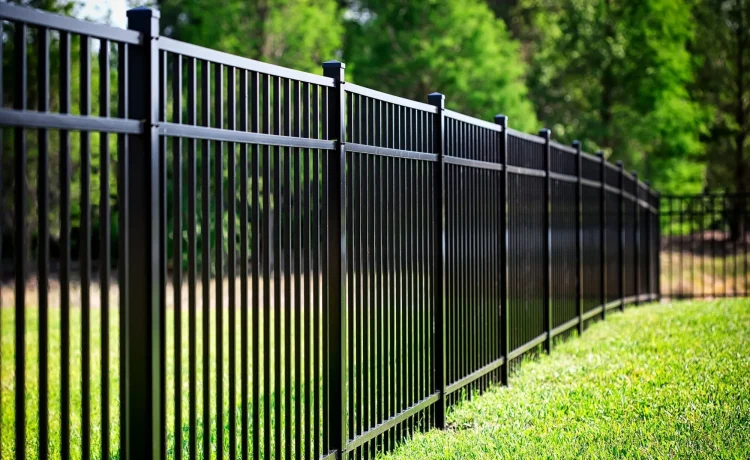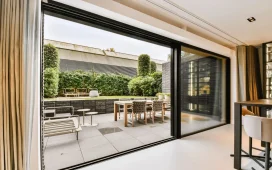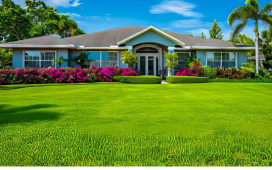Installing a new fence is a significant investment that can enhance the privacy, security, and aesthetic appeal of your property. However, the cost of a fencing project can vary widely depending on several factors. In this guide, we’ll provide a detailed breakdown of the costs involved in fencing projects, including materials, labour, and potential additional expenses, tailored for a British audience.
Materials
The choice of material is one of the most significant factors affecting the cost of a new fence. Here’s a look at the most common fencing materials available in the UK and their typical costs:
- Wooden Fences
- Cost: £20 – £50 per metre
- Description: Wooden fences are popular for their natural look and versatility. They come in various styles, such as picket, panel, and closeboard (featheredge).
- Pros: Affordable, easy to install, and aesthetically pleasing.
- Cons: Requires regular maintenance to prevent rot and weathering.
- Vinyl (uPVC) Fences
- Cost: £40 – £70 per metre
- Description: Vinyl fences are known for their durability and low maintenance. They are available in a variety of colours and styles.
- Pros: Long-lasting, low maintenance, and weather-resistant.
- Cons: Higher initial cost compared to wood.
- Metal Fences (Aluminium and Steel)
- Cost: £50 – £100 per metre
- Description: Metal fences, including aluminium and steel, are strong and durable. They are often used for security purposes and come in decorative designs.
- Pros: Extremely durable, low maintenance, and offers high security.
- Cons: Can be expensive and may require professional installation.
- Chain-Link Fences
- Cost: £20 – £40 per metre
- Description: Chain-link fences are made of galvanized steel wire, woven into a mesh. They are commonly used for security and boundary purposes.
- Pros: Affordable, durable, and low maintenance.
- Cons: Less privacy and less aesthetically pleasing compared to other options.
- Composite Fences
- Cost: £50 – £90 per metre
- Description: Composite fences are made from a mixture of wood fibres and plastic. They offer the appearance of wood with the durability of plastic.
- Pros: Low maintenance, weather-resistant, and aesthetically pleasing.
- Cons: Higher cost than traditional wood.
Labour Costs
Labour costs can significantly impact the overall budget of your fencing project. The complexity of the installation, the type of material, and the contractor’s experience all play a role in determining the cost. Here’s a general idea of what to expect:
- Professional Installation
- Cost: £100 – £300 per day
- Description: Hiring professionals ensures a high-quality installation. Labour costs will vary based on the complexity of the job and the region.
- Pros: Expertise and efficiency, potential for a longer-lasting installation.
- Cons: Higher upfront cost.
- DIY Installation
- Cost: Variable (tool rental or purchase, time)
- Description: For those with the necessary skills and tools, DIY installation can save money on labour costs.
- Pros: Cost savings, personal satisfaction.
- Cons: Time-consuming, potential for errors, and may require tool investment.
Additional Expenses
When budgeting for a new fence, it’s essential to consider potential additional expenses that may arise:
- Removal of Old Fence
- Cost: £100 – £300
- Description: If there is an existing fence that needs to be removed, this will add to the overall cost.
- Pros: Necessary for a clean installation site.
- Cons: Additional expense.
- Fence Post Installation
- Cost: £20 – £50 per post
- Description: Installing fence posts is crucial for stability. The cost will vary depending on the material and ground conditions.
- Pros: Ensures a sturdy fence.
- Cons: Adds to the overall cost.
- Gates and Accessories
- Cost: £100 – £500
- Description: Gates, latches, and other accessories can add to the functionality and security of your fence.
- Pros: Enhances access and security.
- Cons: Additional cost.
- Landscaping and Site Preparation
- Cost: £50 – £200
- Description: Preparing the site, including clearing vegetation and levelling the ground, may be necessary.
- Pros: Ensures a smooth installation process.
- Cons: Additional expense.
- Permits and Planning Permissions
- Cost: £20 – £200
- Description: Depending on your location and the type of fence, you may need to obtain permits or planning permission.
- Pros: Legal compliance.
- Cons: Additional time and expense.
Total Cost Estimate
To give you a clearer picture, let’s consider a hypothetical scenario: installing a 20-metre wooden fence with professional installation and additional expenses. Here’s a breakdown of the potential costs:
- Materials (Wooden Fence): £20 – £50 per metre x 20 metres = £400 – £1,000
- Labour (Professional Installation): £200 per day x 2 days = £400
- Removal of Old Fence: £150
- Fence Post Installation: £30 per post x 10 posts = £300
- Gate and Accessories: £200
- Site Preparation: £100
- Permits and Permissions: £50
Total Estimated Cost: £1,600 – £2,200
Conclusion
Budgeting for a new fence involves several factors, including the choice of materials, labour costs, and additional expenses. By understanding these components, you can plan your fencing project more effectively and avoid unexpected costs. Whether you opt for a wooden, vinyl, metal, chain-link, or composite fence, it’s essential to weigh the pros and cons of each material and consider the long-term maintenance and durability. Professional installation can ensure a high-quality finish, but DIY installation can save money if you have the necessary skills and tools.
Remember to factor in additional expenses such as the removal of old fencing, installation of fence posts, gates, accessories, site preparation, and any required permits. By doing so, you’ll have a comprehensive understanding of the total cost and can make informed decisions to suit your budget and needs. Investing in a new fence can significantly enhance your property’s value, security, and curb appeal, making it a worthwhile endeavour for any homeowner.















